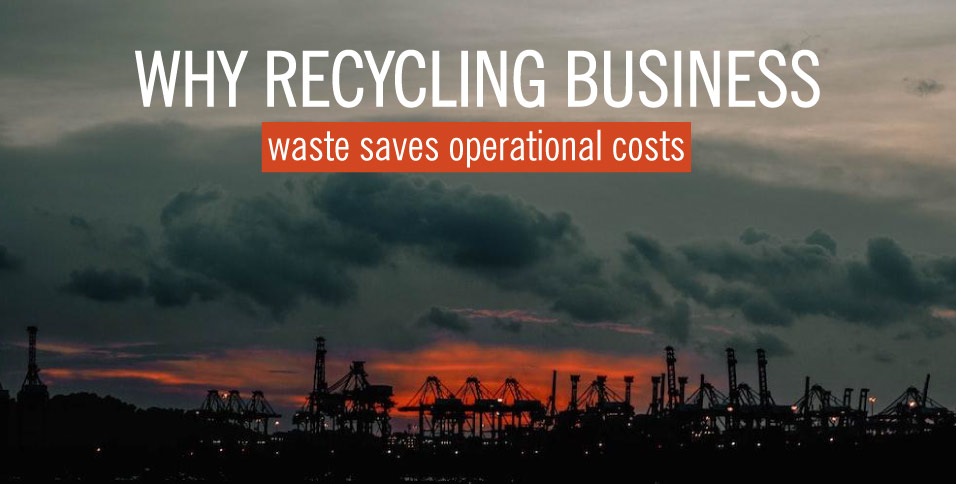Business waste might be one of the most detrimental to the environment. Although government regulations are trying to push boundaries for companies to develop better recycling strategies and be mindful of their impact, it’s less likely that climate change will be slowed down. Still, reducing human emissions or heat-trapping gases may be possible, which would allow the planet’s temperature to stabilise in a few years.
This is achievable only if a global movement encourages all corporations and massive companies to have better practices regarding recycling and managing waste. The manufacturing sector is one of the most contributing to debris since it causes emissions to rise by cutting down forests to leverage their products.
Even if businesses don’t realise their impact, one way of making a change is to see the situation from the perspective of lowering operational costs, which we’ll get into more detail in the following paragraphs.
Profitable wasted resources
Your business can save a lot of time and resources with another way of doing things in the office. For example, toners and ink-jet cartridges can be filled instead of replaced, and documents with no more value can be used as notepaper. At the same time, instead of having disposable cutlery, it’s best to invest in durable materials. In some cases, it would also be best to donate equipment and furniture in good condition to charities.
Even businesses whose tasks include work outside the office can find better ways of saving up. That’s why used & refurbished appliances are sometimes a better choice than purchasing new devices when needed. Luckily, some organisations provide like-new products at a discounted price that you can use ideally.
Trading waste: a myth or not?
Reusing waste can also be done for other businesses instead of yours. Depending on the type of waste you produce, the waste exchange method and the contractual responsibilities, you can offer your products that no longer serve a purpose in your company and deliver them to another establishment that will value them.
Of course, you can also do resource matching, meaning that you can get paid for your waste, but you can also choose to pay for it less than the cost of disposal to save on operational costs. Some examples of resource matching include the following:
- If you have a surplus of certain product bags, you can offer them to companies whose production requirements allow their usage and avoid disposal costs for more sensitive materials;
- If you’ve got waste packaging, you can make an offer to organisations looking for waste materials to create decorations for specific events;
Resource matching may sound challenging since you may need a professional’s advice that can review your business production to assess the availability of your waste resources. The advisor will then identify potential matches with your company and provide some follow-up visits with potential collaborators, as well as referrals to other organisations you can benefit from.
Are there any costs to recycling?
Unfortunately, recycling isn’t only about reaping the benefits of reusing materials. Still, there are some hidden aspects you have to consider. First, recycled material might not be as qualitative in the finished product compared to original materials. This may be more or less accurate for certain materials. For example, paper can’t be recycled forever, so at some point, it’ll lose its consistency and strength.
At the same time, companies who make products from recycled materials have to deal with the stereotype of creating inferior objects, and customers will find everything to contribute to this idea, from the look of the product to the recycled materials used to develop it.
Lastly, recycling materials as a small or big business isn’t easy. Having such a plan seems pretty straightforward: you take the materials and recycle them. But the truth is that you have to be more mindful about handling these materials because they must be sorted and processed, which is a timely process and requires someone knowledgeable to manage the job properly.
Companies will run out of space
Landfills are the first places for a company to dispose of their waste. Yearly, around two billion tons of waste are dumped in these portions of land worldwide. Everything that’s not useful anymore, from electronic waste to heavy metals and chemicals, reaches these places. But how long will we have the space for waste disposal?
At the moment, there’s a landfill crisis that puts the system in a problematic situation. That’s because not every place can become a landfill since these places can become toxic due to the leakage of dangerous substances. Sometimes, these components reach the soil, groundwater, and even drinking water, so they’re risking people’s lives.
So, if we don’t want the planet to become a global landfill, here’s what needs to be done:
- The most obvious solution is to reduce waste production in most industries, especially the ones that create the most debris;
- It’s also best to improve recycling approaches in companies and have a more systematic and down-to-earth procedure;
- It would also be a great idea to use the gas generated by landfills (methane) for fuel;
The development of a circular economy would help minimise waste
A circular economy project is in development, and if it succeeds, it may be the world’s best thing to happen in the past years. This concept works as a closing loop between extraction, manufacturing, and disposal in a way that reduces waste to the minimum and maximises profits.
Besides protecting the environment, this practice can also improve economics by also ensuring safer jobs and healthier communities. In a circular economy, renewable energies are primarily used instead of regular ones, allowing companies to lower their waste contribution as well as provide more sustainable products.
Final considerations
Business waste is the most detrimental when it comes to corporations or companies whose materials can be categorised as hazardous. However, if new and small businesses start with a green mindset from the start, they could save operational costs and minimise many of their expenses while also winning more loyal customers.
Also Read: Realistic methods through which businesses can reduce waste
















